Festivals in Turkey 2025

Having been the connecting bridge between Europe and Asia, new ideas were constantly being exchanged, making festivals in Turkey (Türkiye) the epicentre of various cultures. Over the years, local artistry and customs, as well as global innovations and legacy, have been showcased through the annual and specially held ceremonies. International events like the International Istanbul Film Festival (Uluslararası İstanbul Film Festivali), Cappadox, and Aspendos International Opera and Ballet Festival (Aspendos Uluslararası Opera ve Bale Festivali) attract an abundance of creative minds every year.
Modern-day Turkey has become a hub for artists that display the best of their abilities and carry on the customary practices of the country. Traditional feasts are held throughout the year. Therefore, there’s always something new to see and experience for visitors, even during the public holidays in Turkey. The bigger cities like Istanbul, Ankara, and Izmir are the epicentres for these occasions, but some celebrations are peculiar to certain regions.
Century-old religious and cultural Turkish festivals are significant, as they depict the richness of people's practices that have been perpetuated over the centuries. Travelling to each region during these times is a perfect opportunity to learn more about the country.
Advantour does not manage the events that are listed on this page and is not responsible for any changes in announcements. Though we always strive to deliver the most up-to-date and accurate information, plans can change abruptly and without notice.
Schedule of Turkey Tourism Festivals and Events in 2025
| Name of the event | Date | Venue |
|---|---|---|
| Camel Wrestling Festival | January 3 | Selçuk, Izmir |
| Yıllanmış Festival | TBA* (estimated date: February 8-9) | Istanbul |
| Nevruz (Nowruz) | March 21 | All over Turkey |
| Mesir Paste (Macunu) Festival | March (usually falls on Nevruz, March 21-24) | Manisa |
| Istanbul Tulip Festival | April 1-30 | Istanbul |
| Hıdırellez Festival | May 5-6 | All over Turkey |
| Kirkpinar Oil Wrestling Festival | June 30–July 6 | Edirne |
| The Hot Air Balloon Festival | August 3-11 | Cappadocia |
| The Javelin Game | Second Sunday of September | All over Turkey |
| Whirling Dervishes (Mevlana) Festival | TBA* (most likely December 6-16) | Konya |
Nota Bene: *To Be Announced
Camel Wrestling Festival
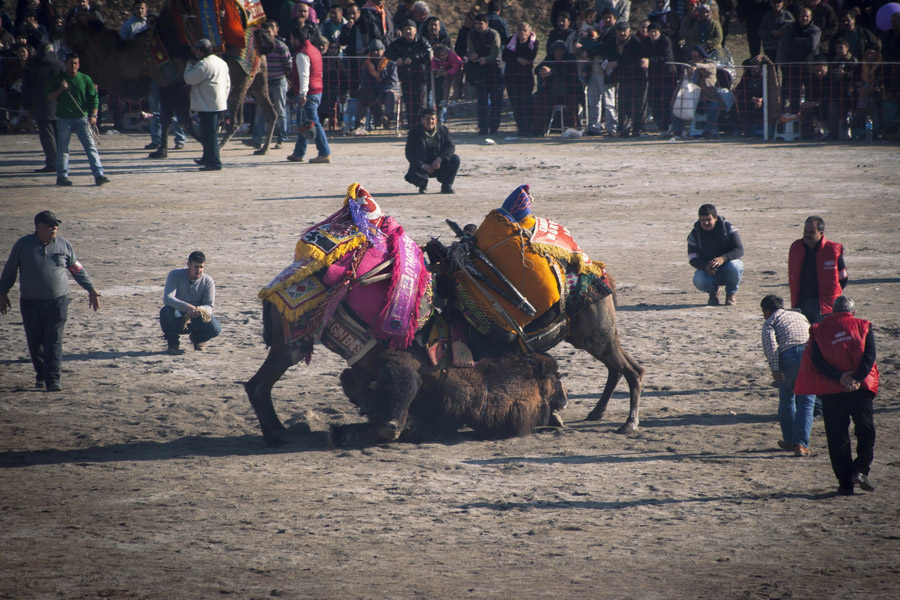
City: Selçuk, Izmir
Date: Third Sunday of January
Camel wrestling is a popular traditional sport on the Aegean Coast of Turkey, and celebrations centred around it are held in various regions from November to March, during the mating season of the Camels. One of the biggest events is carried out in Selçuk, Izmir. On every third Sunday of January, the city holds an annual Camel Wrestling Championship. This practice, which originated over 2400 years ago, is a distinctive feature of the Yörük and nomadic customs, and it has been a part of Turkish culture ever since. The highlight of the wrestling match entails two male camels (Tülü) fighting for one female camel in heat, led before them. The contest continues until one of the “gentlemen” flees from the fight, screams, or falls to the ground.
The night before the big day is when the people socialize. They eat, drink, and make new friends. Additionally, rugs are usually sold in the streets (hence the name “Rug Night” (Halı Gecesi). The day of the match is filled with music and traditional dances like Zeybek. You can even taste local gastronomy, such as various camel meat delicacies, and play different games to soak up the authentic culture.
Yıllanmış Festival
City: Istanbul
Date: TBA* (estimated date: February 8-9)
Due to the rich diversity of Turkey's landscapes, viticulture has been a prominent part of Anatolia’s past. Unsurprisingly, wine is celebrated among connoisseurs, and festivals like this give visitors a perfect opportunity to learn more about local and international varieties alike.
The annual event that is held at the Grand Pera Hotel includes:
- Workshops
- Wine tasting with famous tasters, industry leaders, and renowned artists
- Discussions from professional wine tasters
- Live music
- So much more!
Nevruz
City: All over Turkey
Date: March 21
Nevruz (Nowruz) is a day that indicates the end of winter and commemorates the beginning of spring. It is widely acknowledged by the Anatolian and Central Asian Turks, as well as Iranians, because it has been marking the Persian New Year for more than 3000 years. It falls on the Spring Equinox, when the day and the night become equal.
A celebration of the “New Day (Nov Ruz)” is not exclusive to Turkish people, as several other countries have their own versions of this holiday, including in the Caucasus, the Balkans, and different parts of Asia. It is mainly rooted in Zoroastrianism, and the festival includes many water and fire rituals, dances, singing, gift giving, and so on. It is customary to have a general cleaning of the house, shop for new clothes, visit family and friends, and prepare food for the main feast.
In 2010, the United Nations officially recognised this day as the “International Day of Nowruz”, and it has been added to the UNESCO list of the Intangible Cultural Heritage of Humanity. It should be noted that this day is closely associated with the Kurdish community identity in Turkey, and that in 1995, it was renamed as “Nevruz”.
Mesir Macunu Festival
City: Manisa
Date: March (usually falls on Nevruz, March 21 – 24)
A holiday dedicated to the Mesir Paste is thought to have been held for approximately 400 years, which underlines the deep historical and cultural value of it. The origins of this tradition are rooted in Manisa, Turkey, where Suleiman the Magnificent’s (I Süleyman) mother, Ayşe Hafsa Sultan, recovered from a disease with the help of the aforementioned paste. Happy to have found the cure, the generous Sultan gave an order to distribute the surplus of the newly found medicinal treat to the public.
The original Macunu was spicy, containing 41 different herbs and spices. Yet, the modern version is sweet and usually comes wrapped in paper prepared by 14 women and blessed by 28 imams and apprentices. During the festival, the paste is distributed via throwing large quantities of it from the top of the minaret and the domes of the Sultan Mosque. It is widely believed that catching them will bring the fulfilment of the wishes made that day. Celebrations are held with the accompanying traditional orchestra, performing Ottoman music, dressed in traditional clothing.
Istanbul Tulip Festival
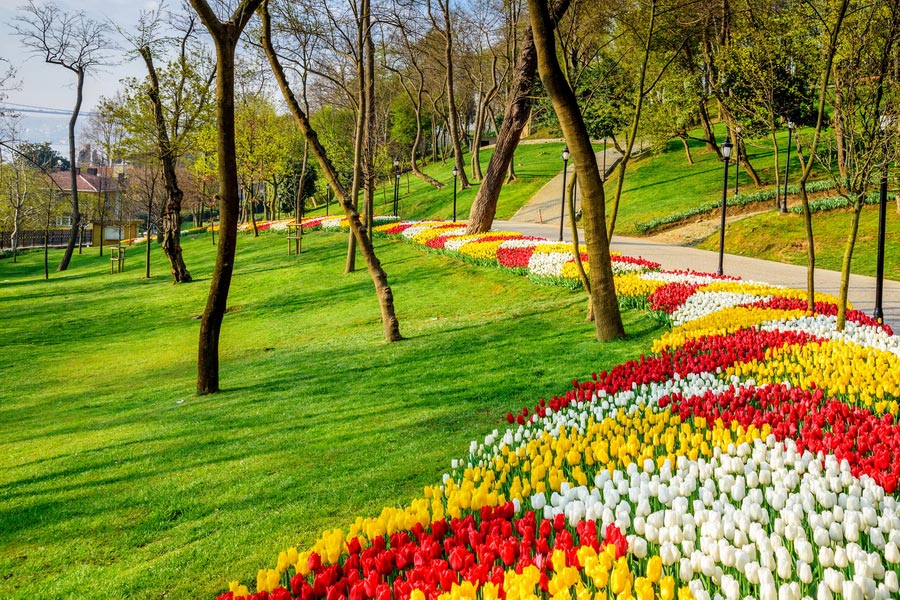
City: Istanbul
Date: April 1 – 30
When nature starts waking up and the flowers start blooming, Istanbul hosts a colourful event dedicated to the national flowers of Turkey–Tulips. They symbolise abundance, prosperity, and renewal. Contrary to popular belief, the Netherlands isn’t the homeland of this gorgeous plant; it gained the attention of Northern Europeans only after seeing them in the Ottoman Empire.
The festival is held throughout the entire month of April, and over 160 varieties of tulips are planted in the city for this occasion. Emirgan Park (Emirgân Korusu) is the most famous location to hold festivities, yet these flowers can be seen at local landmarks and other recreational zones as well.
Hıdırellez Festival
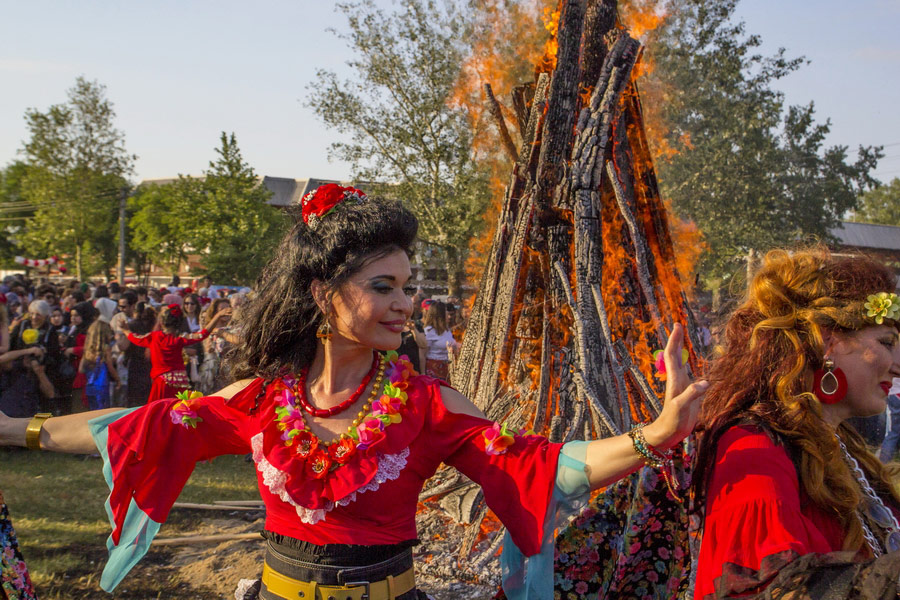
City: All over Turkey
Date: May 5–6
Hıdırellez or Hıdrellez is a pre-Islamic folk holiday originally from Central Asia, associated with the Romani people, and is celebrated in Turkey, as well as the Middle East. It is a commemoration of Al-Khidr (Hızır) and Elijah (Ilyas) – two prophets meeting each other on Earth. The former of the two is prominent in Islam and the latter is present in the main Abrahamic religions, Judaism, Christianity, and Islam, as well as in the Druze faith.
The festival usually falls on St. George’s day for Christians, May 5-6 in the Gregorian calendar and April 23 in the Julian calendar. Its significance is undeniable, and that is why the tradition has been added to UNESCO’s list of Intangible Cultural Heritage National Inventory.
Hıdırellez is held in the countryside, close to the cities and villages where water springs are close, though Istanbul and Edirne have the biggest Hıdırellez celebrations. It is widely believed that the wishes you make come true on this day. This is a festive time of entertainment—you will hear music, sounds of laughter, see people dancing and playing various games, and leaping over fire.
Kırkpınar Oil Wrestling Festival
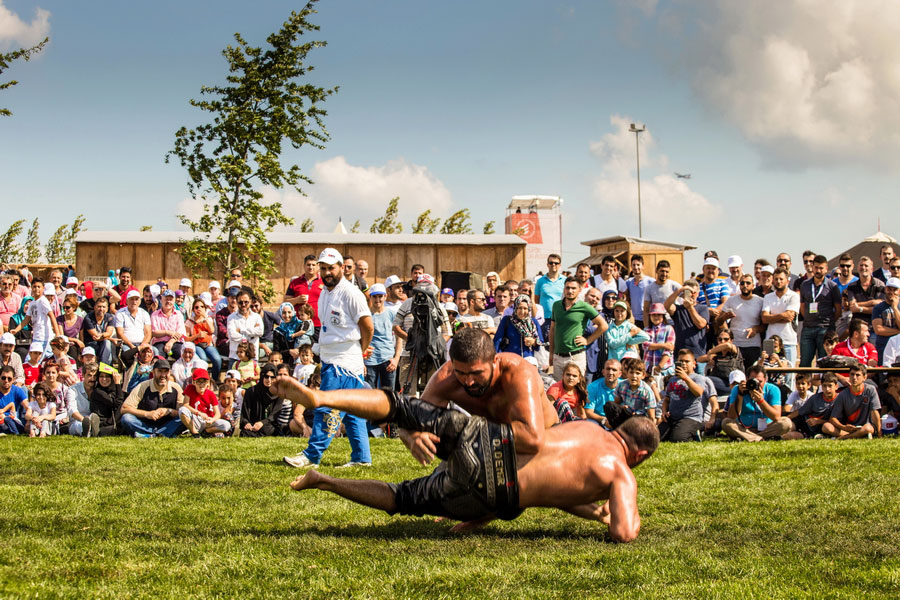
City: Edirne
Date: June 30 – July 6
Edirne, a city in northwestern Turkey, hosts an annual Kırkpınar Oil Wrestling Festival that attracts thousands of people every year. Wrestlers, who are called “Pehlivan”, are oiled from head to toe, and the pinnacle of their battle for dominance is the winner getting the Kırkpınar Golden Belt and the title of Chief Pehlivan. Notably, during the competition they are typically only dressed in special leather trousers–Kispets. The wrestling championship lasts for a week, and the matches are held among 15 age categories and weight classes.
The tradition of this sport comes from the 14th century Ottoman Empire, when Sultan Orhan (Orhan Gazi), in an attempt to keep them physically fit, made his soldiers wrestle covered in oil. This tradition is older than the modern iteration of the Olympic Games. For this reason, it holds a Guinness World Record for “The world's oldest continuously sanctioned sporting competition”, and it has been inscribed on the Representative List of the Intangible Cultural Heritage of Humanity since 2010. The Oil Wrestling Festival is held at the end of June, and the visitors can indulge in delicious food, traditional dances, music, and many more.
The Hot Air Balloon Festival
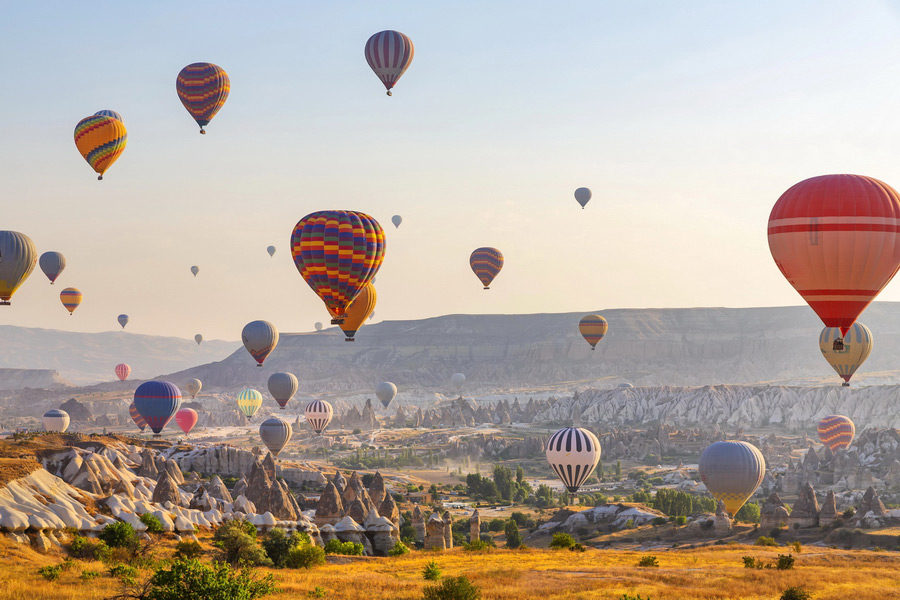
City: Cappadocia
Date: August 3–11
For the past decade, the Cappadocia Hot Air Balloon Festival has become the central destination for tourists who want to have an unforgettable aerial experience. The small historical region in central Anatolia is now synonymous with the sky painted in vibrant hues of air balloons at sunrise.
The view from the basket is breathtaking—the pointed rock formations, also known as “Fairy Chimneys”, create a magical landscape for viewers. The event is usually held every summer, with 2025’s dates being August 3-11 (it may be subject to change).
Besides enjoying the spectacular view from air, you can taste local delicacies and listen to Turkish, as well as internationally acclaimed musicians. Moreover, Cappadocia tours often include hiking in the Göreme National Park and nearby the “Fairy Chimneys”, so that everything you have seen from above can be seen up close.
Javelin Game
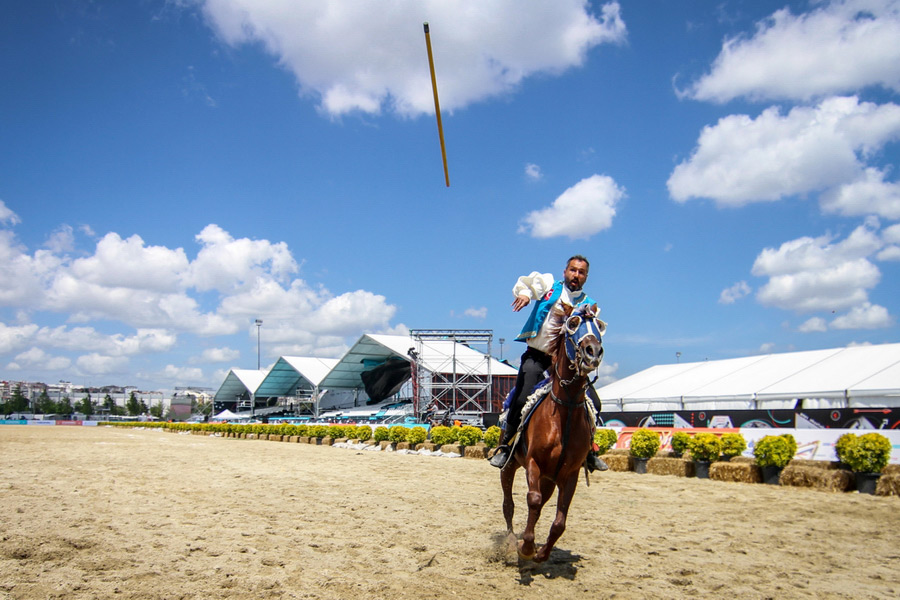
City: All over Turkey
Date: Second Sunday of September
Jereed or “Çavgan” is a traditional Turkish game that has been around for centuries. It originated from the Central Asian Turks and was eventually brought to Anatolia. The game entails two teams of 6, 8, or 12 equestrians each, throwing long sticks (Jereeds) at each other with the intention of hitting the other team’s members to win points, and they lose a point if they hit the horse. The winner is determined by a council made up of former Jareed players.
Historically, the Javelin Game was always associated with a grand ceremony, and it was treated as a sports competition. Under the reign of the Ottomans, it was even considered a war game. Yet, the dangerous nature of it will have not escaped anyone's attention. In fact, Sultan Mahmut II (II Mahmud) banned it in the 19th century.
In the late 20th century, some regions of Turkey started bringing back the old tradition and holding the annual Equestrian Javelin Games. The major cities that actively keep this tradition alive are Erzurum and Bayburt. However, Kars, Konya, Balıkesir, and other Anatolian regions celebrate it too.
Whirling Dervishes (Mevlana) Festival
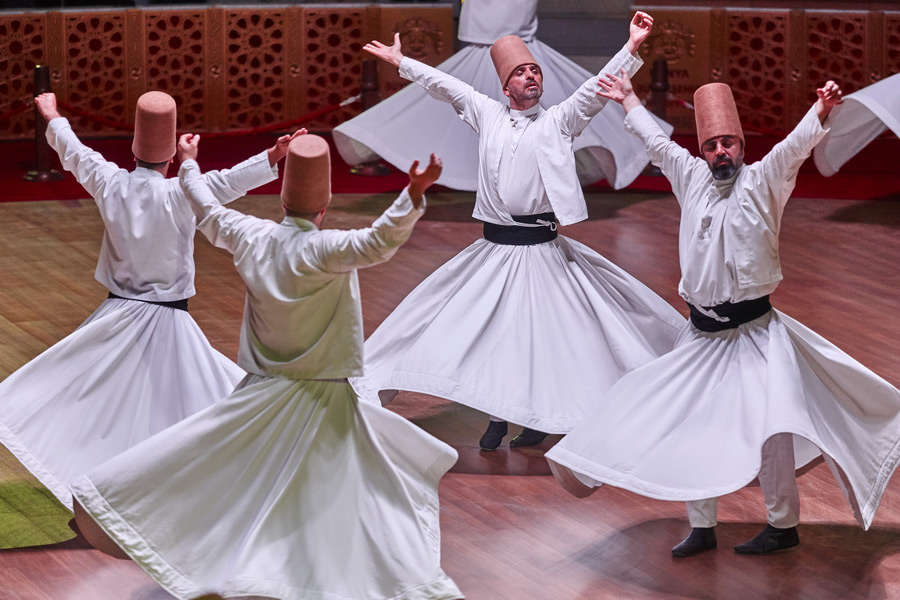
City: Konya
Date: TBA* (most likely December 6–16)
Each year the historically rich city of Konya hosts a series of weeklong ceremonies that honour the union between God and the 13th-century Islamic figure–Jalāl al-Dīn Muḥammad Rūmī (Jelaluddin Rumi). The incredibly intricate prayers and dances are performed by the dervishes of the Mevlevi Order—the Whirling Dervishes. Their Sufi dance, known as the Sema (Sama) ceremony, is symbolic: long white robes represent the shrouds, the black cloaks represent the tombs (or the earthly heaviness), and the long headgear, "sikke", is a symbol of tombstones. After leaving their cloaks on the ground, the dervishes start spinning to go into a hypnotic trance to achieve the ultimate state of consciousness. To symbolise the link between the earth and heaven, the Dervishes raise their right hands to God, and their left hands are extended towards the ground.
The night of Mevlana Jelaluddin Rumi’s death marks his reunion with the Divine, his one true love. This is another celebration related to the Rumi festival—Seb-i Arus, also known as “The Wedding Day”, that is held each year on December 17.
This ritual is considered a cultural heritage, and in 2005 UNESCO proclaimed it as the “Oral and intangible heritage of humanity”.

